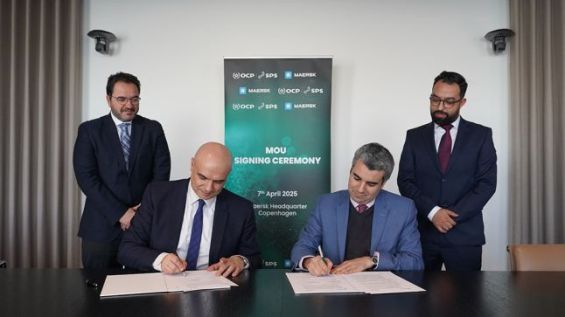OCP Group, through its Specialty Products & Solutions (SPS) unit, has signed a global Memorandum of Understanding (MoU) with A.P. Moller – Maersk to deepen and expand their strategic partnership.
The agreement, signed April 7, aims to build innovative, resilient, and environmentally sustainable supply chain solutions to support OCP’s global growth, particularly in specialty phosphate products.
«This groundbreaking agreement is designed to forge a world-class, resilient, and robust supply chain, capable of withstanding uncertainties in an ever-changing world», Anass Hassainate, Head of Supply Chain & Logistics, SPS SBU at OCP Group. «It aligns with the strategic ambitions of OCP’s global business operations, particularly fostering the growth of specialty product solutions in international markets», she added.
The partnership will enhance OCP’s ocean freight capacity, extend its reach to new global destinations, and establish flexible logistics hubs in Morocco to support global transit operations.
Both companies will focus on digitizing logistics processes and adopting best-in-class practices to strengthen supply chain agility and reliability. In collaboration with Mohammed VI Polytechnic University (UM6P), the partnership will launch joint educational and research programs to boost local talent in logistics, supply chain management, and sustainability.
Sustainability is a central pillar of the agreement, with joint efforts targeting the decarbonization of logistics operations, exploration of green fuels, and the implementation of energy-efficient practices. Both companies reaffirmed their commitment to reaching net zero emissions by 2040.
This agreement reinforces OCP’s green investment strategy (2023–2027), which includes $13 billion in investments to increase fertilizer production and switch to 100% renewable energy.
Since early 2025, OCP has achieved full reliance on non-conventional water sources, with a desalination capacity goal of 560 million m³ annually by 2027. It plans to become carbon neutral across scopes 1 and 2 by 2030 and fully carbon neutral (including scope 3) by 2040.
Maersk, a global logistics leader with a presence in over 130 countries and a workforce of around 100,000, is also working toward carbon neutrality by 2040 through the use of innovative technologies and low-emission fuels.





 chargement...
chargement...













